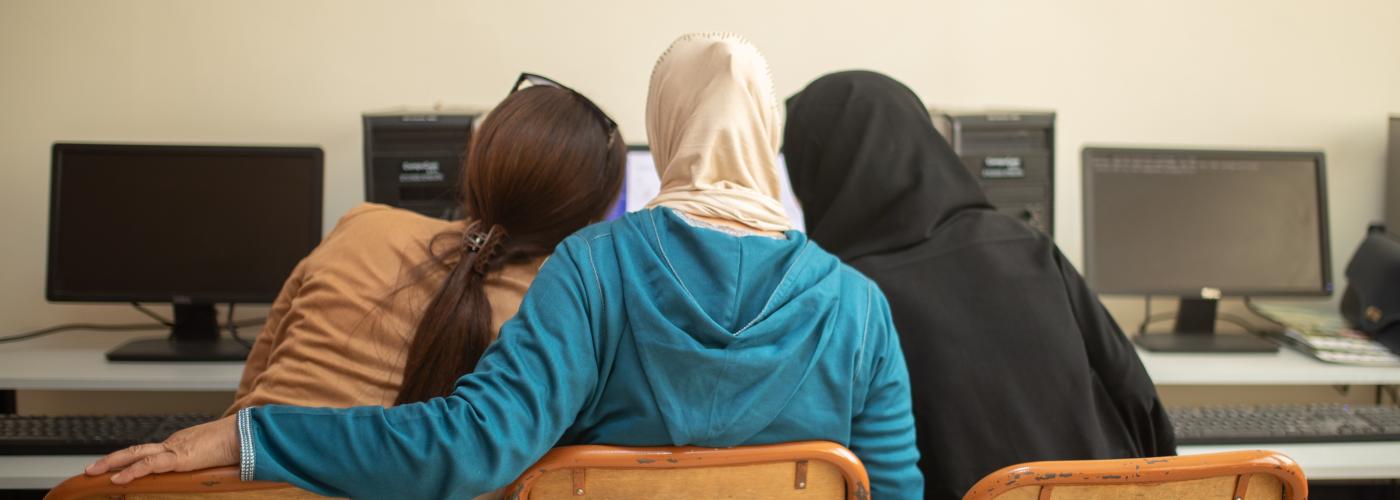Expanding Internet Access in Rural Morocco
Image

This photo blog is based on an interview with AFCHIX Morocco Coordinator Houda Chakri conducted on May 17, 2023. Photographs taken by Mosa’ab Elshamy on April 30, 2023.
Ait Izdeg’s 8,400 residents live deep in the Atlas Mountains in central Morocco. Their town’s remote location has made it challenging to access reliable Internet. Until now.
Image

In 2022, USAID WomenConnect Challenge (WCC) recipient AFCHIX installed the hardware needed to connect the town to satellite internet, extending access to four schools and approximately 700 residents.
AFCHIX is a network of African women in technology who believe that gender diversity is crucial to building a thriving and innovative ICT sector in Africa. Through the WomenConnect Challenge, the organization was awarded two grants to expand women’s access to the Internet and provide digital training to over 370 women in Kenya, Morocco, Namibia, and Senegal. In Ait Izdeg, AFCHIX built community networks that use new, low-cost electronic networking equipment to provide small-scale community-based network services and affordable internet access at a fraction of standard commercial prices.
“This is one of the poorest regions in Morocco. There are plenty of regions that have economic resources to be able to deliver internet infrastructure. But this region is one of the most underserved,” says Houda Chakri, AFCHIX Morocco Project Coordinator.
After installing physical communication infrastructure in the town of Ait Izdeg, AFCHIX hosted a series of digital skills trainings to equip women with the skills to establish their own businesses, facilitate access to education and healthcare, and position women as role models within their communities. AFCHIX’s training program also teaches women the technical skills to install and maintain the network hardware, including towers and modems.
The trainings have given women like Hafida, a member of a cooperative that makes and sells different varieties of traditional Moroccan couscous, knowledge of basic computer skills, how to use the internet, and how to navigate a smartphone.
Local women are also trained to maintain the installed network infrastructure and to develop sustainable business plans to manage the way their communities access the internet through the networks.
Image

While many of the women accessing the networks have low levels of digital literacy, they are motivated to learn. They participated in AFCHIX’s small business skills training that taught them bookkeeping, accounting, and how to use social media platforms, such as Facebook or Instagram, to market their businesses and better provide for their families.
Image

As the project comes to a close, AFCHIX has made sustainability a priority. In Morocco, the organization has partnered with a local parents’ association in Jbel Ayachi to continue, and potentially even scale up, digital literacy training. Nour El Houda (top), the treasurer of the association, has been instrumental in these efforts.
Image

“If the [parents’ association] can scale it up, that would be great,” said Houda. “Their reach is regional, so why not. They can reproduce or duplicate whatever was implemented in Ait Izdeg in other rural areas in the region.”
Image

“Populations in those rural areas are still suffering from digital illiteracy and access. Access to economic opportunities is still a struggle for those women, so my vision is to help break the isolation,” she said. “If we can scale up and help them access (the internet), this would be very good.”
Image

Expanding internet access in rural Morocco has been essential for communities like Ait Izdeg and the success of the project underscores the importance of community networks and their role in bridging the gender digital divide and empowering women. Without the connectivity enabled by these networks, women in remote areas of Ait Izdeg could not have accessed the valuable skills gained through digital literacy training, which, in turn, has allowed them to grow their businesses, increase their livelihoods, resilience, and economic security, while earning a living to help support their families.
ABOUT THE AUTHOR: The USAID WomenConnect Challenge is implemented by DAI’s Digital Frontiers project, a buy-in mechanism that works to advance USAID's Digital Strategy. This blog was written by DAI’s Digital Frontiers project with support from the Training Resource Group.

